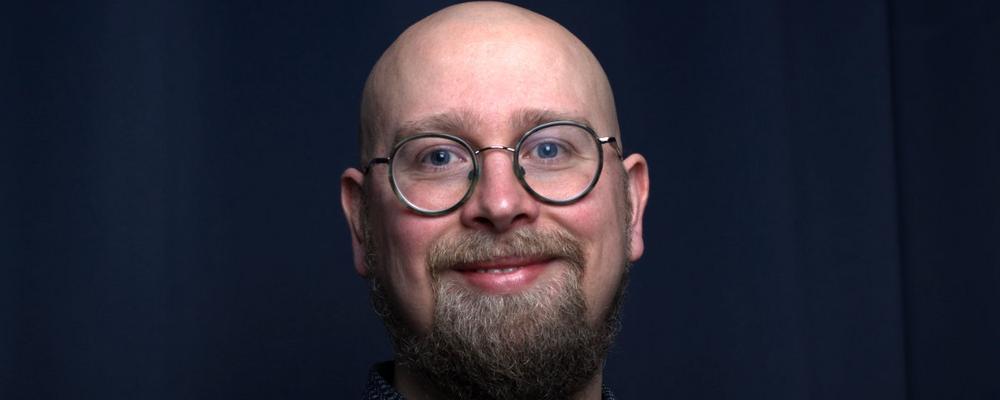What's your research about?
'My research aims to figure out how bacteria interact with each other, and how that can lead to antibiotic resistance and disease-causing ability, as well as having impacts on human health.
What big scientific questions are you working with?
'Currently, there are three lines of research in my lab. Firstly, how does antibiotic resistance develop and how does it spread? Secondly, what makes pathogen bacteria pathogenic? What is it that differ in pathogens compared to non-pathogens, especially when it comes to bacteria in the same group of species? Thirdly, what kind of mechanisms are behind interactions between bacteria, and what happens when these interactions are disturbed?
What's your scientific background?
'During my Master Studies, I was given the responsibility for doing the bioinformatics part. I analyzed DNA-sequences from periphyton, which is the slimy stuff on rocks at the seashore and on ship hulls. Periphyton can facilitate growth of subaquatic organisms on ship hulls, affecting a vessel’s performance and fuel efficiency. The traditional method to combat this is to use anti-fouling paint, which has had a toxic effect on marine life. The project aimed at finding alternative non-toxic solutions.
'Given the challenge to be responsible for bioinformatics made me find my niche, and to realize that I really could contribute to scientific projects with my knowledge, despite not being a particularly skilled person in the lab. During that time, I came into contact with Professor Joakim Larsson and learned about his work with antibiotic resistance in the environment. This was an eye-opener for me and I realized the global seriousness of the issue. Then Joakim issued a position for a PhD-student, which I applied for, and got the position.
'Then during my postdoctoral studies we used models for bacterial interactions, specifically between three different species of bacteria, to try and find out what happens if you interfere in their interactions. Can removal of specific genes alter the balance between the bacteria in the model? What happens if you introduce a fourth bacterium, and what significance have different genetic changes to that interaction? The genes that have been identified as important for interactions, what are their molecular function in the interactions? During my postdoctoral time we did large scale screening of mutants and then continued to study single bacteria mutants. We are now doing done studies of over-expression of some of these genes in my lab to see if we can increase the intensity of these interactions.
What's your research group's vision?
'My long-term vision is to be able to predict and thereby hinder, or at least postpone, development of antibiotic resistance. I wish we could be able to predict what is going to happen in terms of development of antibiotic resistance and pathogenicity. The end-goal would be to find a way to do preventive environmental monitoring in specific risk settings to avoid that pathogenic and antibiotic resistant bacteria meet humans.
Why did you start researching?
'I am very curious. After finishing my bachelor’s degree I thought there where so many questions still unanswered from my thesis, so I kept working on the material on the side during my master studies. The interest to understand biological processes has always been there. I am similarly curious about the workings of the universe, although I know much less about the details there. When I found my niche within bioinformatics, I realized that I could contribute with my computer skills to biology and do important science.
'Science and the academic way of thinking have always been present in my family, since my father is a Professor in Ecology and my grandfather is a Professor in Law. My father has been very supportive and we have had a continuous discussion on different scientific issues, opening up my perspectives on how ecology can impact things such as antibiotic resistance development and human health.
Who do you collaborate with?
'I am part of the program of Centre for Antibiotic Resistance Research, CARe, which is a great arena for interdisciplinary knowledge exchange. There has, for example, been a highly interesting discussion on ethics related to antibiotics use and resistance development with different researchers from different fields. When researchers from philosophy meets researchers within medicine and natural sciences on a topic of common interest you get new insights and new views of the problems. Some of my closest collaborators are also my fellow PIs in the EMBARK project, where I am the coordinator. These are a team of incredibly smart and ambitious scientists and I get a lot out of working with them. I also keep collaborating with my post-doc supervisor Jo Handelsman at the University of Wisconsin-Madison and with Joakim Larsson who supervised by PhD thesis. Recently, I have also extended my contact network within Sahlgrenska University Hospital, working on the human microbiome with for example Sara Lindén and Henrik Hagberg.
Read more on the website The Bengtsson-Palme Lab.
March 2022
Interview by Niclas Lundh.
Page manager: webb@biomedicine.gu.se
